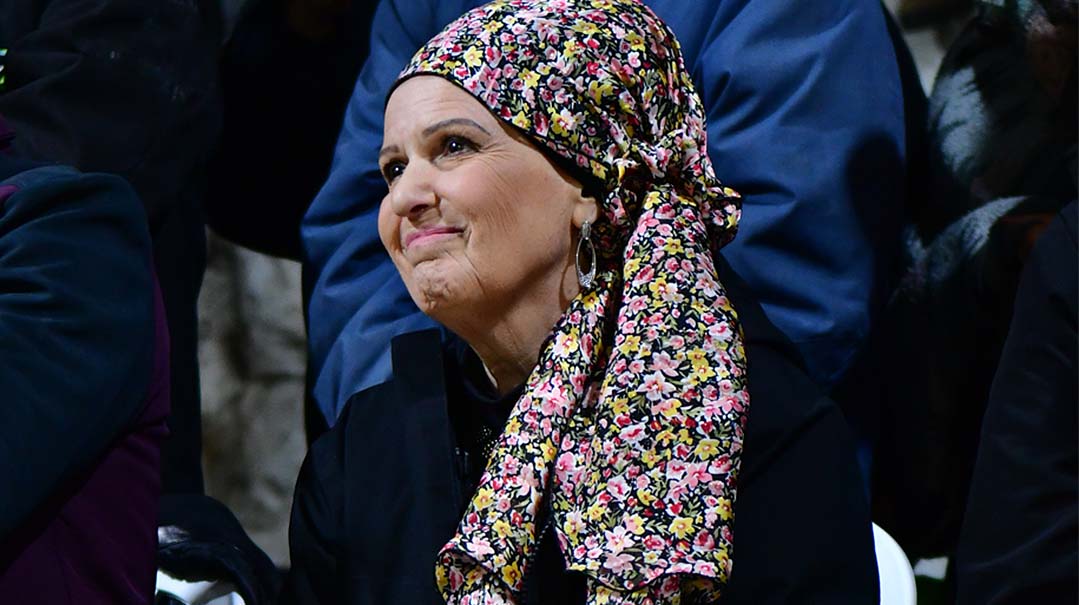Esther Was My Soul Mate

Jonathan Pollard bids farewell to his wife and tireless advocate

Photos: Elchanan Kotler
It would be a major understatement to say that Esther Pollard did everything in her power to help her husband, Jonathan Pollard, through 30 years of
trial and tribulation.
It truly took a superpower that few people possess — the sort that is usually found only in storybooks — to marry a man imprisoned for spying and then sentenced to a life term with only the dimmest of prospects for ever getting out.
But that was the magnitude and mesirus nefesh of Esther Pollard, who passed away Monday morning in Jerusalem at age 68 after a prolonged illness that she battled with the same determination and courage that she showed her husband, and everyone who knew her.
It would likewise be a major understatement to say that Jonathan Pollard is alive today thanks to Esther.
The man who knows that better than anyone else is Rabbi Pesach Lerner, the chairman of the Eretz HaKodesh faction at the World Zionist Organization. An earnest and untiring advocate for Pollard, and more of a brother to Jonathan than a friend, Rabbi Lerner logged tens of thousands of air miles during his years as executive vice president of the National Council of Young Israel, visiting Pollard in Butner, a forsaken part of rural North Carolina.
“I’m a witness in so many ways that Jonathan Pollard is alive today because of Esther,” Rabbi Lerner said. “Esther was Jonathan’s biggest advocate and his best friend. A lot of people helped, but she led the battle and kept it going.”
Her self-sacrifice didn’t go unnoticed, even in the most unexpected quarters.
“Some of the prison guards at Butner were honest people,” Rabbi Lerner recalls. “After seeing Esther visit Jonathan, some of them even remarked, ‘This lady is special. She is keeping him alive.’ ”
As I noted a few months ago, when covering their sefer Torah dedication at Kever Yosef, the Pollards and I became friends following my visit to the cramped studio apartment they lived in on Manhattan’s Upper East Side after Jonathan was paroled in 2015.
She had a regal bearing, one that women would describe as both tznuah and a strong inner core. Due to her immuno-compromised condition, we were not able to socialize as often as we would have liked since they made aliyah. On the occasions when we did get together, either for meetings with parties interested in promoting yishuv Eretz Yisrael, and even once sharing dinner at Piccolino, their favorite Jerusalem restaurant, people were drawn to her, to express their love and appreciation. Esther was supremely patient with the many people who would introduce themselves to her husband, or ask to take selfies with him.
Esther Pollard, née Zeitz, opened up to Mishpacha’s associate editor Rachel Ginsberg in a March 2007 profile (“Marriage Made in Prison,” Issue #150), explaining what drew her to marry a man in the midst of a life sentence, and how she and Jonathan inspired each other to dream of a better life.
Originally from Montreal, Esther became a special education teacher.
She and Jonathan met for the first time in 1971 on a trip to Israeli for teenage youth. They realized they shared a mutual love for the land and people of Israel.
Each returned home to their own lives; Jonathan to South Bend, Indiana, and Esther to Montreal, and they forgot about each other.
They picked up their correspondence again in 1990 when Esther was a summer intern at Israel’s Ministry of Justice and taught English at Hebrew University. Someone handed her a flyer urging people to write to Jonathan Pollard in prison, saying that he derived great comfort from those letters.
“It never even occurred to me that this was my old youth group friend,” Esther recalled.
She sent off an aerogram, and was touched to the core by Jonathan’s response, which was full of love and devotion to the land and the people of Israel.
“I was always lonely until he came into my life,” Esther said. “I never lacked for friends and companionship, but I always felt something was missing. As soon as Jonathan showed up, we recognized that we were soul mates.”
I followed up on that theme with Esther a few months ago when I interviewed her and Jonathan two days after the sefer Torah dedication at Kever Yosef. It was a harrowing night, as Arab terrorists in Shechem attacked our IDF-escorted convoy while leaving the city. The courage the Pollards showed that night was very much in character for Esther, who was never afraid to take a stance and then follow what she believed was right.
“Nobody ever believed Jonathan would ever get out,” Esther said. “People would mock me and say, ‘You’re just throwing your life away. Do you think he’s ever going to come home? Think again.’ I got that a lot. In the media, those who were trying to shut me up and get me away from Jonathan, for their own reason, wrote that Jonathan was an ‘ambition’ on my part, and I just wanted my own prisoner of Zion.
“Jonathan and I never had any doubt he would come home, because we know G-d runs the world and nobody else,” she said. “People thought it was ridiculous, but we always knew it would happen. We just didn’t know when or how it would happen.”
First Impressions
Rabbi Lerner, whose relationship with the Pollards dates back more than 30 years, always witnessed how the couple fortified themselves with emunah, finding strength in each other.
When the National Council of Young Israel hired Rabbi Lerner as its executive vice president in 1991, he began to learn the territory by visiting member synagogues.
One night, Rabbi Lerner visited the Young Israel of Manhattan on the Lower East Side and listened to a presentation on the Pollard case.
“I walked out with a lot of questions about a Jew in prison,” Rabbi Lerner said.
Afterward, he consulted with his rabbinic mentors, who, at the time, included Ner Israel’s longtime president, Rabbi Naftali Neuberger, and its rosh yeshivah, Rav Yaakov Weinberg.
“I had a lot of questions about the treatment he was getting,” Rabbi Lerner said. “I was advised to do my homework and follow my feelings, which I did.”
The National Council of Young Israel board also proved to be very supportive of Rabbi Lerner’s interest in the Pollard case.
But there is only so much research one can do from a distance, so Rabbi Lerner decided he needed to meet Jonathan and Esther in person.
There was always a bit of trepidation involved in planning a visit to a federal prison, especially to visit Pollard.
Jonathan Pollard’s reputation as a spy always preceded him, even if he only spied on behalf of Israel, a strategic ally of the US. His case has always made many American Jews chafe at the neck because it raised the canard of “dual loyalty.” It takes some research and debating skills to parry those charges.
“People were never sure what type of person Pollard really was,” Rabbi Lerner said. “When I asked Esther, she told me, ‘Meet him, and then ask me the question again.’
“I met an individual with depth, breadth, sensitivity, and belief in G-d. He committed a crime, but he admitted it. He didn’t deserve a life sentence or solitary confinement, or the physical abuse to which he was subjected. Esther herself was a true eishes chayil, in every sense of the word. She gave up her whole life and her health for Jonathan over the years.”
The Pollards were married in a secret ceremony in prison in 1993, performed by a rabbi, according to halachah. To this day, the Pollards never publicly revealed how they were able to accomplish this unnoticed by prison officials, who would normally monitor Pollard’s every move.
Six years later, in 1999, Esther was diagnosed with cancer, but the slander against Jonathan that she had to bear was every bit as painful. Calling their marriage “an oasis of unconditional love in a sea of lies and corruption,” she said, “Truth is what our relationship is about — it’s the foundation. Otherwise it couldn’t endure under such stressful, dreadful conditions for so many years. Despite all the hardships placed upon us, despite all the privations of simple gestures all couples enjoy, Jonathan has made me feel like the most loved, valued, and treasured woman in the world.”
“Esther was bright and she always had a plan of action,” Rabbi Lerner says. “She was in charge of the website [Justice4JP]. She could write case histories and she was able to give Jonathan the love and the chizuk to keep him alive.”
She did all this while living on a bare-bones budget. She had a modest pension from her teaching career in Canada. She used that to help defray expenses during her years in Jerusalem, where she shared an apartment with an elderly woman who gave her a room.
Israeli youth sympathetic to the Pollards’ plight occasionally raised some funds, and Rabbi Lerner was also able to fundraise enough so that Esther could at least travel back and forth to visit Jonathan.
“It was difficult at times, but she was a trooper,” Rabbi Lerner said. “She loved him and she believed in him. She made it her cause.”
Conditions in Butner were challenging, even for a short visit. The small town of 7,000 people doesn’t have five-star hotels, not that Esther could have afforded them.
“Did you ever go to a Motel 6?” Rabbi Lerner asked me. “Esther Pollard lived in the equivalent of a Motel 6 when she went to visit Jonathan. Maybe even worse. She had no funds. What did she live on? Tuna fish? Bread?”
Realizing she needed assistance, Rabbi Lerner undertook to send kosher meals in advance to wherever she was staying. “Some years she went down there for Pesach. She would spend the Seders alone in her motel room just so she could be with Jonathan on Chol Hamoed.”
When Esther was able to get back to Eretz Yisrael, she would make what she called “tefillah trips.” She davened at the Kosel every day and also organized bi-weekly trips for women to kivrei tzaddikim. She also developed a close relationship with Rabbi Mordechai Eliyahu, Israel’s former chief Sephardic rabbi, who made it his business to fly to America once a year to visit Jonathan in prison.

A New Life in Israel
Eventually, the Pollards’ prayers, emunah, persistence, and self-sacrifice paid off.
Their first major legal break came in November 2015, when Pollard was released on parole, 30 years from the date of his arrest in 1985.
However, the United States Parole Commission imposed draconian conditions on his release.
Jonathan was forced to wear a bulky wristband, larger than a shirt cuff, that tracked his movements 24/7. He was placed under a strict curfew for the next five years, and his freedom of movement outside of Manhattan was sharply curtailed.
Rabbi Lerner shared one last story that sheds light on Esther’s determination to break the chains that bound them to America and enable them to make aliyah, or “come home” as Jonathan always called it.
There are many people who lobbied on behalf of the Pollards over the years, and the heroes are too numerous to name.
A personal acquaintance, Chaim Stern, introduced Rabbi Lerner to John Hagee, the mega-church pastor and “televangelist” who is also founder and chairman of Christians United for Israel. With a vast audience of evangelicals, Hagee wields great political influence in the Republican Party.
About 15 years ago, Hagee visited Pollard for two hours in prison. Rabbi Lerner related his reaction: “As he walked out, he looked at me and said, ‘Rabbi, I’m a man of faith. That’s what I do for a living. But I’ve never met a man of faith like the man I just met.”
The waning days of the Trump administration coincided with the end of Pollard’s five-year parole. The government had a decision to make. Either renew the terms of the parole, soften them, or pardon Pollard and let him “go home.”
When Trump was still president, Esther accompanied Rabbi Lerner to see Pastor Hagee. Joining them was Rabbi Aryeh Scheinberg z”l, former spiritual leader of Congregation Rodfei Sholom in San Antonio, Texas, where Hagee’s mega-church is based.
Locked in a tight reelection battle with Joe Biden, Trump needed the evangelical vote that Hagee could potentially deliver.
“Without going into any great detail, Esther was able to passionately and emotionally give over Jonathan’s story. When you finish a conversation with Esther Pollard, you’re motivated to do something because you see the mesirus nefesh.”
There is no way of knowing how that one meeting might have moved the needle in Pollard’s favor, but three weeks before Trump left office, the parole commission called up Jonathan one Erev Shabbos and said, “You can cut off the wristband, the parole is over and you’re a free man.”
A month later, on the last day of 2020, the Pollards boarded a private plane to come home.
They had every hope that the story would have a longer and happier ending.
By the time Esther arrived in Israel, she was still under treatment protocols designed in New York to battle her illness. Hadassah Hospital in Jerusalem replicated them and treated her nobly for the last year, until she finally succumbed on the morning of Erev Rosh Chodesh Adar Alef.
“Both she and Jonathan firmly believed that HaKadosh Baruch Hu had a plan for them and that one day they would understand it.,” Rabbi Lerner said. “She will be remembered as a gibborah who fought the battles valiantly — both the political and the physical. She did it with her head held high and was proud of everything she did.”
At the hesped, Jonathan tearfully but with great composure spoke of Esther’s great love for the land.
“As much as you loved the land, the land will now love you, and the land will embrace you,” he said. “You will truly become part of the land that you loved.”
“Undiluted. Unchanged and pure. That’s who she was.”
Describing the last two days Esther spent in Hadassah and the vigil he kept at her bedside, Jonathan said: “I never saw anyone as brave as she was. Never doubt the bravery and courage of a woman.
“At the end I was given two choices. Let her die naturally or let her fight. I looked at the doctor and said, ‘You know, this woman fought for me for 30 years. I’m not giving up on her. I’m going to give her the opportunity to do what she does best and that’s fight.’ And he agreed.
“It’s the loyalty a husband owes his wife, and she sure demonstrated loyalty to her husband over many years. In G-d’s good time, we’ll be together again.”
(Originally featured in Mishpacha, Issue 897)
Oops! We could not locate your form.






